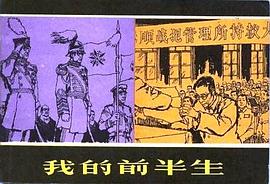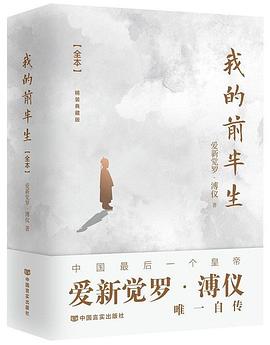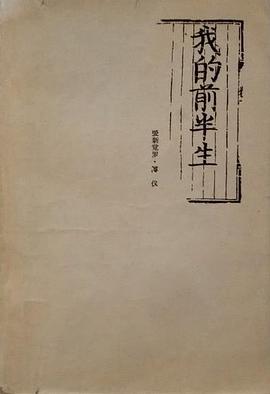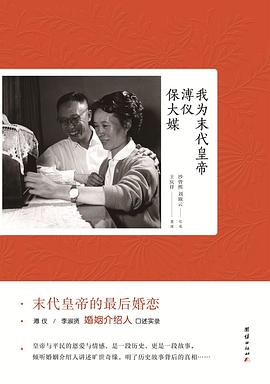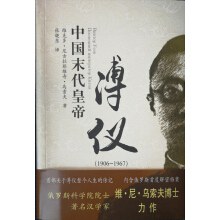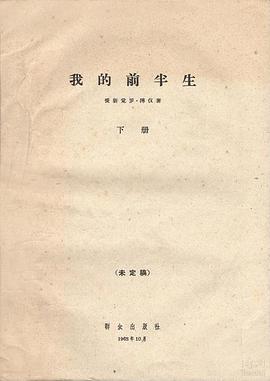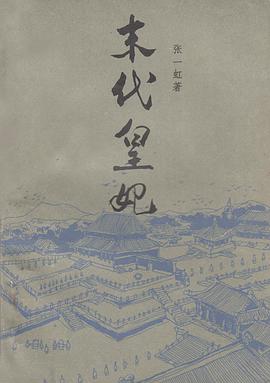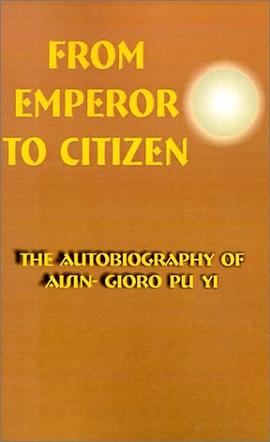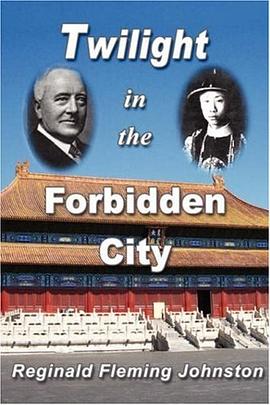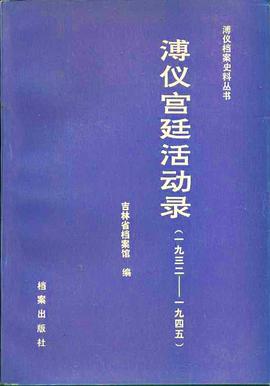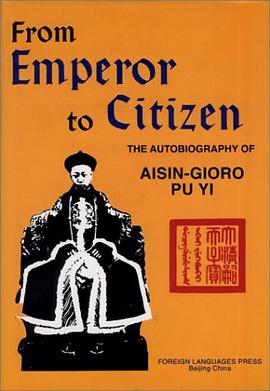

具体描述
From Emperor to Citien is the
autobiography of Pu Yi, the man who
was the last emperor of China. A
unique memoir of the first half of the
20th century as seen through the eyes
of one born to be an absolute
monarch, the book begins with the
author's vivid account of the last,
decadent days of the Ching Dynasty,
and closes with an introspective
self-portrait of the last Ching emperor
transformed into a retiring scholar
and citizen of the People's Republic
of China.
In detailing the events of the fifty
years between his ascension to the
throne and the final period of his life
as a quiet-living resident of Beijing,
Pu Yi reveals himself to be first and
foremost a survivor, caught up in the
torrent of global power struggles and
world conflict that played itself out
on the Asian continent through many
decades of violence and upheaval.
This firsthand description of the
dramatic events of Pu Yi's life was the
basis for the intemationally acclaimed
1987 Bemardo Bertolucci film The
Last Emperor which was named Best
Picture of the Year by the American
Academy of Motion Picture Arts and
Sciences. From Emperor to Citizen
readily lends itself to cinematic
adaptation as a personal narrative of
continuously significant and revea-
ling episodes.
Becoming emperor and then
forced to abdicate with the
establishment of the Republic of
China in 1911, all before he is seven
years old, Pu Yi continues to live in
the Forbidden City for another
decade, still treated as the Son of
Heaven by the moribund Ching court,
but in reality a virtual prisoner, with
little genuine human contact apart
from his beloved nurse Mrs. Wang,
his teacher Chen Pao-shen and his
English tutor Reginald Johnston.
When at the age of nineteen Pu Yi
is finally forced to vacate his isolated
existence within the Forbidden City,
he begins his long odyssey as the
dependent of the occupying imperial
Japanese regime, first in Tientsin, and
eventually installed as "emperor" of
the Japanese puppet state styled
Manchukuo in China's northeast
provinces. With the defeat of Japan
and the end of the Second World War,
Pu Yi faces a very uncertain future as
he is shunted off to Russia for five
years before retuming to a new China
transformed by revolution, where he
is confined in the Fushun War
Criminal Prison. Here he undergoes
several years of rehabilitation,
"learning how to become a human
being," as he calls it, before receiving
an official pardon and being allowed
to finally live as an ordinary citizen of
Beijing.
This autobiography is the culmi-
nation of a unique and remarkable
life, told simply, directly and frankly
by a man whose circumstances and
experiences were like no other.
作者简介
目录信息
CHAPTER ONE MY FAMILY
My Grandfather Prince Chun
My Maternal Grandfather Jung Lu
Tzu Hsi's Decision
My Father's Regency
A Prince's Household
CHAPTER TWO CHILDHOOD
Accession and Abdication
Living as an Emperor
Mothers and Son
Studying in the Yu Ching Palace
Eunuchs
My Nurse
CHAPTER THREE FROM THE FORBIDDEN CITY TO
THEJAPANESE LEGATION
The Yuan Shih-kai Period
The Restoration of 1917
The Chiettains of the Peiyang Clique
Undying Hope
Reginald Johnston
My Wedding
Internal Clashes
The Dispersal of the Eunuchs
Reorganizing the Household Department
The Last Days in the Forbidden City
In the Northern Mansion
Decision at the Crossroads
CHAPTERFOUR TIENTSIN
The Efforts of Lo Chen-yu
My Relations with the Commanders of the Fengtien Clique
Semionov and the "Second Chukeh Liang"
The Affair of the Eastern Mausolea
Consulate, Garrison and Black Dragon Society
Life in the Temporary Palace
CHAPTERFIVE TO THE NORTHEAST
The Unquiet Qyiet Garden
Differences Among the Japanese
Meeting Doihara
The Secret Crossing of the Pai River
Isolated
Disappointment
Meeting Itagaki
CHAPTER SIX FOURTEEN YEARS OF
"MANCHUKUO"
The Puppet Play Begins
Majesty Without Power
The Signing of the Secret Treaty and After
The Report of the League of Nations Commission of Enquiry
"Emperor" for the Third Time
The End of Illusion
Yoshioka Yasunori
"Imperial Rescripts'
Home Life
The Collapse
CHAPTER SEVEN IN THE SOVIET UNION
Fear and Illusion
Still Giving Myself Airs
1 Refuse to Admit My Guilt
CHAPTER EIGHT FROM FEAR TO RECOGNIZING MY
GUILT
I Expect to Die
Arriving in Fushun
Separated from My Family
Move to Harbin
Writing My Autobiography and Presenting My Seals
Changes in My Household
Contession and Leniency
Making Boxes
The Investigators Arrive
The Suffermgs and Hatred of the People of the Northeast
"You Can Never Escape the Consequences of Your Sins"
CHAPTER NINE 1 ACCEPT REMOULDING
How Shall 1 Be a Man?
It Is Up to Me
Why So Magnanimous?
The Changes Explain Everything
Meeting Relations
The Japanese War Criminals
"The World's Glory"
Another Visit
Labour and Optimism
The Test
Special Pardon
A New Chapter
INDEX
· · · · · · (收起)
读后感
李文达是这本书的“捉刀人” 应该是基本史实。当然他是基于抚顺战犯管理所时期由傅仪口述,傅杰执笔的《前半生》(自传体悔罪思想报告之类的东西)。但是后面成书,李文达的工作是至关重要的。 因为即使经过初步整理,原《前半生》依然是“很多事情记不清,说不清,只是自己的...
评分对于一个已经逝去的人写的东西,不是什么著作,只能给还行了。 不好意思,和《堂吉诃德》一样,没有看完。其实很想把它看完,以一个人对明星隐私的偷窥欲想看一个皇帝的前半生是怎样度过的。不像《堂吉诃德》,看个开头和结尾,就知道它要讲什么,想表达什么。这是一部自传,他...
评分三岁稀里糊涂登了极,三年后慌里慌张退了位。1932开始做了十四年的满洲国皇帝,受尽了人本的摆布,名副其实的傀儡皇帝。日本战败投降,被苏联红军逮捕,在苏联关押了五年。1950年回国,1959年十年国庆大赦出狱,在中国的监狱里面又改造了10年。 有人认为作为一名末代皇帝,溥仪...
评分对于一个已经逝去的人写的东西,不是什么著作,只能给还行了。 不好意思,和《堂吉诃德》一样,没有看完。其实很想把它看完,以一个人对明星隐私的偷窥欲想看一个皇帝的前半生是怎样度过的。不像《堂吉诃德》,看个开头和结尾,就知道它要讲什么,想表达什么。这是一部自传,他...
评分用户评价
补记 好本子
评分很好的书。结合末代皇帝这部电影来看。
评分很好的书。结合末代皇帝这部电影来看。
评分很好的书。结合末代皇帝这部电影来看。
评分补记 好本子
相关图书
本站所有内容均为互联网搜索引擎提供的公开搜索信息,本站不存储任何数据与内容,任何内容与数据均与本站无关,如有需要请联系相关搜索引擎包括但不限于百度,google,bing,sogou 等
© 2025 onlinetoolsland.com All Rights Reserved. 本本书屋 版权所有

